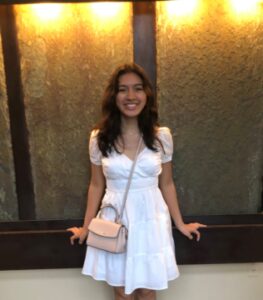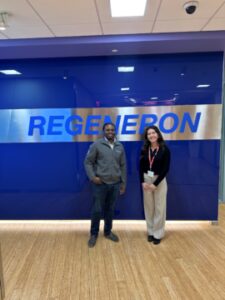
Through the generous support of Regeneron, four times a year River Journal publishes the on-site report of a high school science student from the River Towns who is paired with a Regeneron scientist to experience what it is like to put STEM education to work in the real world.
In February, my science research teacher presented me with the opportunity to interview a Regeneron scientist, and I accepted without a second thought. As a member of the science research program at Ossining High School, I’m constantly hearing about the generous ways Regeneron helps motivate young scientists in the area. I recently took a trip with my science research program to Regeneron’s DNA Learning Center, where I got to do a hands-on experiment with DNA. Since that trip, I’ve been curious about what goes on at the Regeneron Pharmaceuticals campus that is only a 20-minute drive from my home.
When I arrived at Regeneron’s Tarrytown campus in March, I was intimidated by its exterior and nervous about interviewing a scientist — and the fact that I got lost certainly wasn’t helping. However, at the end of my visit I walked out of Regeneron’s doors with a completely different sentiment; one of inspiration and newfound courage.
Dr. Ralph Hazlewood is a Senior Manager in the Genetics Medicines organization at Regeneron. Outside of work, Dr. Hazlewood is skilled in Capoeira, a Brazilian martial art combined with elements of dance. He also proudly admits to enjoying making slime, which is something I admire. He mentioned that he was always curious about science, but it wasn’t until college that he knew it was something he wanted to fully pursue for a career.
Dr. Hazlewood specializes in ophthalmology and diseases that affect the eye and cause blindness, like Glaucoma. He manages a wide range of projects, spanning various eye disorders that affect the different regions of the eye. The projects that he manages have a common goal of identifying treatments to help individuals with eye disorders.
When asked what solidified his interest in eye disorders and started his career in biotechnology, Dr. Hazlewood responded that a project that he worked on during his postdoctoral fellowship sort of sparked it all. This project investigated the impact of repurposing existing FDA approved drugs (a hypertension drug in particular) in a mouse model of glaucoma. This drug targets the TGF-Beta mechanism. When high-blood pressure occurs patients, TGF-Beta is overproduced, and this can lead to a cascade of events that negatively affect the eye, which can ultimately lead to blindness. The drug that Dr. Hazlewood investigated in this project reduces the signaling of TGF-Beta thus providing a potential treatment option with the goal of preventing blindness due to glaucoma.
Dr. Hazlewood mentioned that this project was such a significant moment in his career because it gave him a sense of how drug discovery is done, but more importantly it made him understand how what he was doing contributed to the bigger picture of restoring eye function. This feeling of accomplishment is something I hope to achieve throughout my science research project, which is about how Parkinson’s Disease negatively affects people’s ability to safely swallow food. In particular, cough is crucial for expelling material out of the airway, and is often impaired in Parkinson’s patients. I hope to examine possible treatments for cough strength in Parkinson’s patients. If I can make even the smallest dent in Parkinson’s research, then I’ll feel like I’ve accomplished something great.

Dr. Hazlewood said that the most rewarding part of his job at Regeneron is knowing that eventually his team will get a product, along with seeing how everything he does can help making medicines for people. I caught a sense of this while Dr. Hazlewood gave me a tour of some of Regeneron’s ophthalmology labs. I was amazed by how many different things can go on in a single lab room, from examining a rat’s eye to testing tissue protein samples. This showed me how Dr. Hazlewood and the many scientists at Regeneron are constantly working to improve the lives of people and make the most of the resources they have.
Lastly, Dr. Hazlewood left me with a few pieces of advice for high school students interested in a career in STEM. He said that we don’t need to have everything figured out right now, we have a lot of time. If we have courage and aren’t afraid to jump at the opportunities we come across, we will end up doing something that we feel is truly valuable.






